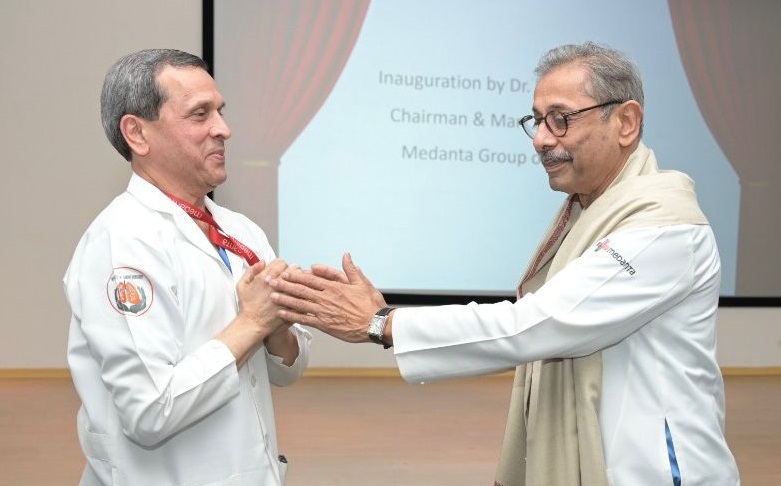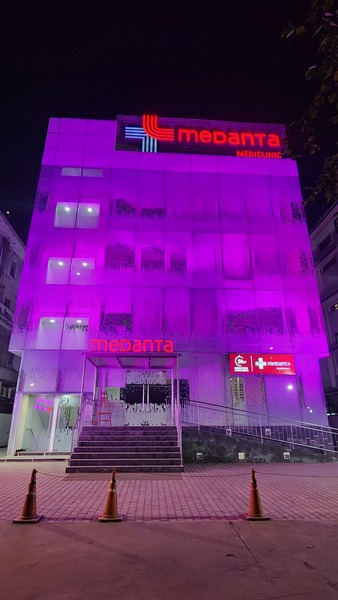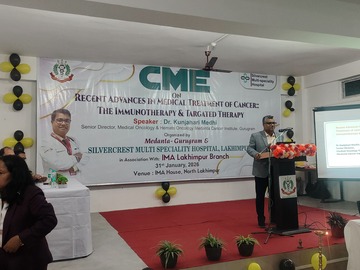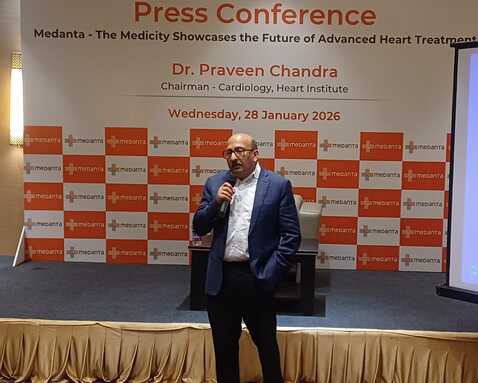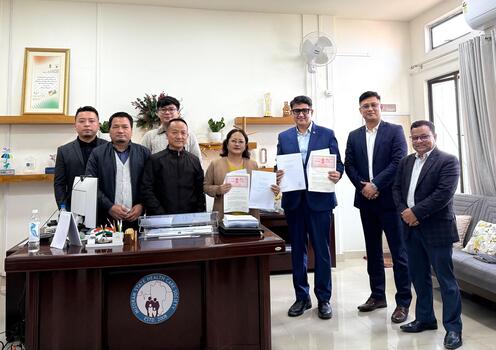
Medanta Raises Awareness about Advanced Treatments for Thalassemia and Leukaemia in Gwalior
Gwalior, 5th April 2024: Taking a step towards tackling two of India’s most significant healthcare challenges, thalassemia and leukaemia, Medanta - The Medicity – one of India's leading multi-specialty hospitals ranked as the Best Private Hospital in the country by Newsweek - organised an awareness session in Gwalior to educate the patients and general audience about the cutting-edge treatment options for these conditions. Led by Dr. Satya Prakash Yadav, Director of Paediatric Hemato Oncology and Bone Marrow Transplant at Medanta Gurugram, the initiative focused on advancing the understanding of Bone Marrow Transplant (BMT) and CAR T-cell therapy as curative options for life-threatening conditions such as thalassemia, blood cancer (leukaemia), and bone marrow failure. The session also introduced emerging treatments, including gene therapy, for thalassemia patients.
Both thalassemia and leukaemia are severe blood disorders that present significant health challenges. Thalassemia, a common congenital condition, impairs the body's ability to produce red blood cells, making regular blood transfusions essential for survival. Leukaemia, a cancer of blood-forming tissues—including the bone marrow and lymphatic system—has seen a concerning rise in incidence. According to the Global Burden of Disease (GBD) study, leukaemia cases increased by 26% between 2006 and 2016, with 467,000 new diagnoses and 310,000 reported deaths in 2016 alone.[1]
Additionally, the 2020-21 Annual Report of the Department of Health and Family Welfare highlights a significant prevalence of thalassemia among caste communities in Madhya Pradesh.[2] Gwalior, in particular, bears a heavy burden of both thalassemia and leukaemia, making it one of the leading causes of frequent blood transfusions and mortality among children in the region.[3] However, advancements in treatment, such as BMT and emerging gene therapy, are eliminating the need for lifelong blood transfusions in thalassemia patients. For leukaemia, CAR T cell therapy, an innovative immunotherapy that re-programmes a patient’s T-cells to attack cancer cells, offers a promising curative option for difficult-to-treat cases.
Dr. Satya Prakash Yadav, Director of Paediatric Hemato Oncology and Bone Marrow Transplant at Medanta, Gurugram, said, "Despite advancements in treatment, blood cancer and thalassemia remain significant health concerns in India. For patients with thalassemia, a bone marrow transplant is the only curative option, with success rates exceeding 90% when performed early in life with a fully matched sibling donor. Similarly, for blood cancers like leukaemia, innovative therapies such as CAR T-cell therapy are showing promise for complex cases. Unfortunately, access to these critical treatments remains limited, especially in northern regions of the country where facilities are scarce, forcing many children to rely on frequent blood transfusions for thalassemia. The gap is further widened by a lack of awareness, a diverse gene pool, and misconceptions around stem cell donation. Our efforts focus on bridging gaps in awareness, increasing donor registrations, and improving access to life-saving treatments, so more patients can benefit from these transformative advancements."
Dr. Yadav further emphasised the need for doctors, healthcare providers, policymakers, and the public to work together in raising awareness, dispelling myths, and creating a supportive environment for bone marrow transplant. Through these collective efforts, we can save countless lives and significantly improve the health outcomes for thousands of children affected by thalassemia and leukaemia.
This initiative in Gwalior is a part of Medanta’s larger effort to raise awareness and improve access to BMT across India. In collaboration with Coal India, Medanta has embarked on a national mission to reduce the burden of thalassemia by supporting BMT for affected patients. Through this partnership, up to INR 10 lakhs of financial aid is made available to patients in need, ensuring that economic constraints do not prevent them from receiving this life-saving treatment.
[1]https://www.njlm.net/articles/PDF/2774/62201_CE[Ra1]_F(SHU)_QC(AN_SHU)_PF1(HB_OM_SHU)_PFA(SHU)_PB(HB_SHU)_PN(SHU).pdf
[2] https://timesofindia.indiatimes.com/city/indore/75-of-sickle-cell-anaemia-cases-from-4-tribal-districts-of-madhya-pradesh/articleshow/87671049.cms
[3]https://academicmed.org/Uploads/Volume5Issue4/410.%20[1196.%20JAMP_Jayden%20Raj%20Gulrej]%202049-2052.pdf#:~:text=There%20were%20a%20total%20of%2071%20cases,phenotypeT/Myeloid%20Leukemia%20as%20shown%20in%20Table%201.&text=In%20the%20present%20series%2C%2071%20cases%20of%20acute%20leukemia%20were%20diagnosed.
